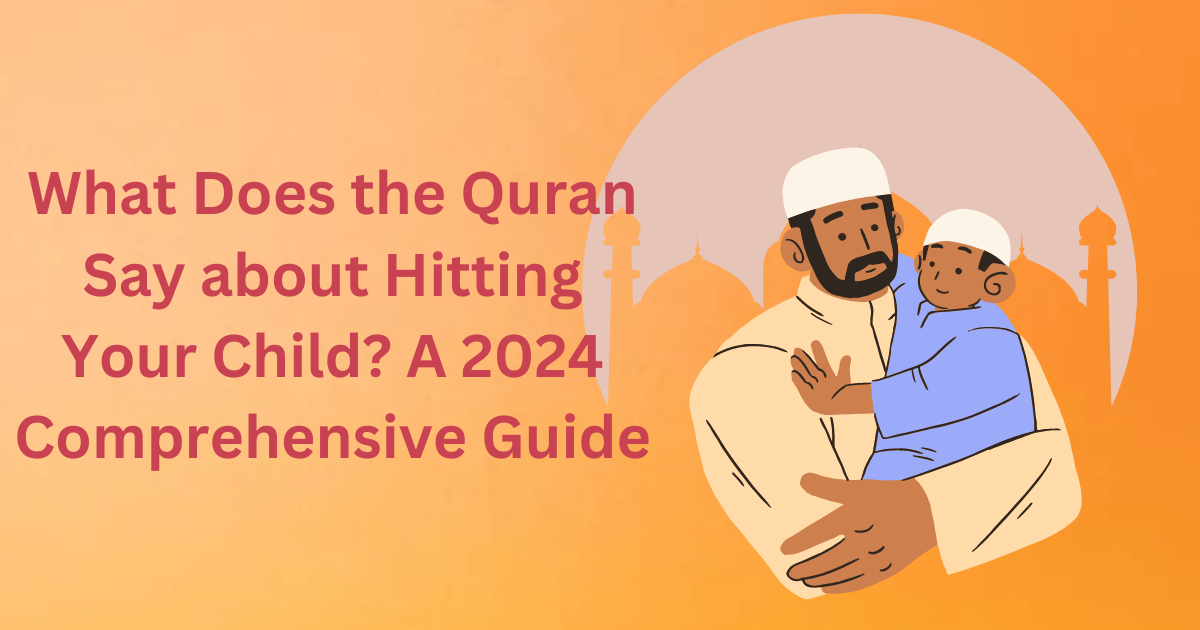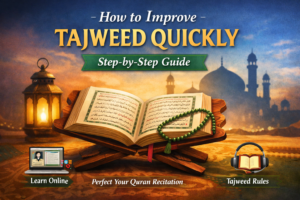In Islam, the art of raising children is rooted in compassion, patience, and gentle guidance. The concept of “hitting” as understood in English often conjures images of harsh punishment, but in the Islamic context, the Arabic term “ضرب” carries a much softer meaning—one that emphasizes light, symbolic acts rather than physical force.
The true essence of Islamic parenting lies in fostering love, positive reinforcement, and moral guidance, ensuring that discipline never strays into the realm of harm or harshness. Misusing this delicate balance, or resorting to severe measures, is not only discouraged but is considered a grave sin with consequences that extend beyond this life.
Below we will tackle the meaning of “hitting” in Islam and what the Quran says about hitting your child. We will discuss as well whether hitting a child is Haram in Islam, and what the conditions are for it not to be Haram.
Then, we will talk about hitting “a daughter” in particular, and whether this is Haram in Islam. Also, we will discuss how to discipline a child Islamically. Finally, we will speak about the punishment for parents who mistreat their children.
Table of Contents
What Is “Hitting” in Islam?
Before we discuss what Islam says about hitting your child, let’s first define “hitting”. The English word: “hitting” gives too much meaning for the Arabic word “ضرب”. So let’s see what the Arabic verb “ضَرَب” specifically means.
To make it clearer, let’s see 2 occurrences where this verb is mentioned in the Quran and the tradition of Prophet Muhammad (peace be upon him):
1- Allah says in the Quran:
“Let them not stomp their feet, drawing attention to their hidden adornments.”
“وَلَا يَضْرِبْنَ بِأَرْجُلِهِنَّ لِيُعْلَمَ مَا يُخْفِينَ مِن زِينَتِهِنَّ”
The verb “يضربن” here means to raise the shoe and stomp on it lightly. So there is a slightly heavier physical contact between the shoe and the ground.
2- Allah’s Messenger (ﷺ) said:
“Tayammum is two strikes: one for the face and one for the hands up to the elbows.”
“التَّيَمُّمُ ضَرْبَتَانِ ضَرْبَةٌ لِلْوَجْهِ، وَضَرْبَةٌ لِلْيَدَيْنِ إِلَى اَلْمِرْفَقَيْنِ”.
In this hadith, the Prophet (peace be upon him) tells Muslims how to make Tayammum [an act of purification that replaces Wudoa when there is no or very little water]. Here, he said that a Muslim making Tayammum should slightly “hit” (the same word ضربة is used here) a surface that has some clean dust on it with his palms twice.
The point is that the practice of the Prophet (peace be upon him) and the companions is to make a slight strike on the ground so that some dust is attached to their palms. So again the verb “يضرب” here means to make a slight physical contact between your palms and the ground. So “hitting” can be as simple as this slight act, no more.
What Does the Quran Say about Hitting Your Child?
In fact, the Quran does not say anything about hitting children. In such cases, Muslims have to refer to the Sunnah of Prophet Muhammad (peace be upon him) to see and copy how he used to treat his own children and the children of other Muslims and even of other non-Muslims in his community, which we will discuss in detail.
Islamic teachings emphasize kindness, compassion, and respect in all interactions, including those with children. Islam advocates for a nurturing and supportive environment to foster a child’s physical, emotional, and spiritual well-being. The Prophet Muhammad (peace be upon him) exemplified a merciful approach to dealing with children, emphasizing patience and gentle guidance.
Islamic scholars have interpreted the principles of the Quran to conclude that harsh physical punishment is generally discouraged. The overall Islamic ethos promotes mercy and compassion, suggesting that hitting children is not in line with these values. Islamic jurisprudence (fiqh) also often discusses the rights and well-being of children, emphasizing that any form of discipline should aim at their betterment and should not harm them physically or emotionally.
Is Hitting Your Child Haram in Islam? (Hadith about Hitting Children):
As mentioned above, the meaning of the verb “ضرب” is to make a slight physical contact between you and something for some reason. In the case of parenting, “hitting”, in this specific sense, can be used by a parent as a last resort, with the clear message that they are not satisfied with the child’s behavior and that the child needs to behave.
There is a specific hadith in the Sunnah of Prophet Muhammad (peace be upon him) which directs a parent to command their children to pray when they are 7 years old and to give them 3 years to do so, and if they do not, the father should “hit” [in this same meaning of hitting and discipline described above] their children when they are 10.
Prophet Muhammad (peace be upon him) said:
“Teach a boy Salat (the prayer) when he attains the age of seven years, and punish [hit] him (if he does not offer it) at ten”.
“علموا الصبي الصلاة لسبع سنين واضربوه عليها ابن عشر سنين”.
For hitting not to be Haram in Islam, it has some conditions:
1- It Must Be Minor and Merciful:
Most Muslim scholars suggest that parents can use a stick as small as a Misuak [a small stick that earlier Muslims used to brush their teeth] when “hitting” their children. Please see the size of the Misuak compared to a hand in the following picture.
2- It Must Be the Last Resort:
A parent must never start discipline with hitting. First, they have to use kind words calmly to guide the child, then they can repeat what they have said more assertively. Then, they can use the no-contact technique, a loss of some privileges, or time-outs. After that, they may resort to hitting in the sense we have established above.
3- A Parent Must Avoid the Face [hadith about slapping on the face]:
By no means a parent is allowed to hit a child on the face even with a slight strike, as this act destroys the sense of dignity and respect in the child’s heart.
This was made very clear by Jabir [a prominent companion of the Prophet] who narrated that Prophet Muhammad (peace be upon him) forbade striking the face and branding on the face [hadith about slapping on the face].
عَنْ جَابِرٍ قَالَ: “نَهَى رَسُولُ اللَّهِ صَلَّى اللَّهُ عَلَيْهِ وَسَلَّمَ عَنِ الضَّرْبِ فِي الْوَجْهِ وَعَنِ الْوَسْمِ فِي الْوَجْه”.
4- It Must not Be Out of Anger:
It is not permissible for a parent to use physical violence against their child as a way to vent their frustration or anger. Remember that the only purpose here is discipline, nothing more. So even if you are angry, wait until your anger goes away and then start to guide your child to the right behavior.
Slapping Daughter in Islam:
In Islam, there are numerous instructions from Prophet Muhammad (peace be upon him) for parents to treat their daughter(s) very well and of course not to resort to slapping or mistreating them in any way. Let’s see three hadiths in this context:
1- Daughters as A Shield from Hellfire:
Prophet Muhammad (peace be upon him) said:
“Whoever has three daughters and is patient towards them, and feeds them, gives them to drink, and clothes them from his wealth; they will be a shield for him from the Fire on the Day of Resurrection.”
“مَنْ كَانَ لَهُ ثَلاَثُ بَنَاتٍ فَصَبَرَ عَلَيْهِنَّ وَأَطْعَمَهُنَّ وَسَقَاهُنَّ وَكَسَاهُنَّ مِنْ جِدَتِهِ – كُنَّ لَهُ حِجَابًا مِنَ النَّارِ يَوْمَ الْقِيَامَةِ”.
In this hadith, Prophet Muhammad (peace be upon him) commands all fathers to treat their daughters well and, most importantly, be patient with them. The reward the Prophet (peace be upon him) promised the fathers who abide by that command is Jannah [Paradise].
2- How the Prophet (Peace Be Upon Him) Treated His Daughters:
We should also know that Prophet Muhammad (peace be upon him) is the role model for all Muslims to follow. He had 4 daughters and he never hit or slapped any one of them, even once in his entire life.
In this context, Prophet Muhammad (peace be upon him) said:
“Act kindly toward women…”
“اسْتَوْصُوا بِالنِّسَاءِ خَيْرًا”
In this hadith, Prophet Muhammad (peace be upon him) commands Muslim men to be kind to women in general and to treat them well, let alone their own daughters.
3- Women as Fragile Glass Vessels:
Prophet Muhammad (peace be upon him) even used a metaphor, in another hadith, to describe women as “قوارير” [fragile glass vessels], meaning that they need more gentle treatment.
Prophet Muhammad (peace be upon him) said:
“May Allah be merciful to you, O Anjasha! Drive the camels slowly, as they are carrying Qwarir!”
“وَيْحَكَ يَا أَنْجَشَةُ، رُوَيْدَكَ سَوْقًا بِالْقَوَارِيرِ”.
Here, Prophet Muhammad (peace be upon him) spoke to the person who used to sing to the camels to make them move faster. The Prophet (peace be upon him) told him not to make the camels move too fast as they were carrying women who were like fragile glass vessels, i.e. they needed gentle treatment.
Is It Haram to Hit Your Daughter in Islam?
Any kind of physical violence against your daughter is Haram. As a father, you should always treat your daughter(s) nicely. There are always more productive ways to discipline daughters if they misbehave. Below you can see some of these ways and methods.
Prophet Muhammad (peace be upon him) emphasized treating daughters with love and kindness. In several Hadiths, he expressed the importance of caring for and respecting daughters, highlighting their significant value in society.
One Hadith states, “Whoever has a daughter and does not bury her alive, does not insult her, and does not favor his son over her, Allah will enter him into Paradise.”
“مَنْ كَانَتْ لَهُ ابْنَةٌ فَلَمْ يَئِدْهَا، وَلَمْ يُهِنْهَا، وَلَمْ يُؤْثِرِ ابْنَهُ عَلَيْهَا، أَدْخَلَهُ اللهُ الجَنَّةَ”
This Hadith underscores the importance of treating daughters with dignity and respect, which inherently excludes physical violence.
The relationship between Prophet Muhammad (peace be upon him) and his daughter, Fatima, serves as a beautiful example of the mutual love and respect that should exist between parents and daughters.
The Prophet (peace be upon him) showered Fatima with love and affection, often referring to her as “the apple of my eye”. Whenever he saw her coming, he used to stand up, kiss her on the forehead, and invite her to sit beside him.
How to Discipline a Child in Islam?
Islamic guidelines for child discipline highlight the importance of kind guidance, positive reinforcement, and assertive teaching of right and wrong. Physical punishment is strongly discouraged and should only be used with extreme caution and as a last resort, rather than the first solution.
Child discipline is a gradual process in Islam. It has so many aspects, including:
1- Unconditional love:
First of all, a child must be showered with unconditional love. A parent has to show their child through words and actions that they love them for who they are, and if they resort to punishment, it is their child’s bad behavior that they dislike and not their own child. This is a fundamental base for child discipline.
If this is the kind of feeling between a parent and a child, the child would immediately and automatically feel uncomfortable once they feel their parent is upset with their behavior and would be quick to fix it. Some parental guidance may still be needed.
2- Positive Reinforcement:
As a parent, you should reward good behavior with praise and affection. This helps a child understand what is expected of them and encourages them to repeat good behaviors.
3- Guidance and Teaching:
Do not just tell your child to do this and not to do that. Explain the reasons for rules and expectations in a way that they can comprehend. Involve your kid in setting the rules and how to achieve the required tasks so that adhering to them can be a bit easier.
4- Patience and Understanding:
Let’s be clear here: children are still learning and developing. Be patient and understanding, and remember that they may make mistakes and that it is completely fine. Your role is to make them willing to not repeat their misbehavior, rather than making them Angelic enough to not misbehave in the first place.
5- Avoiding Harsh Treatment:
Never use yelling, insulting, or name-calling. Do not call your child “naughty” or “a loser”. These can greatly harm a child’s self-esteem and emotional well-being.
6- Setting Clear Boundaries:
Put clear rules for your child’s behavior. Be consistent in enforcing them. For example, before going to visit a sick person, tell your child that you will be there for a short time and that you need them to be quiet there and if they need anything, they should use a very low tone of voice; because sick people cannot handle long visits or loud voices.
7- Positive Neglect:
This is a powerful parenting strategy that most parents and educators are not aware of. It means to intentionally ignore MINOR misbehavior to avoid reinforcing it. The aim is that the child will most probably not repeat it when the parent does not give attention to it.
There is a good Arabic proverb to reinforce this idea. It is “العاقل مَن تغافل” [A wise person is one who chooses to ignore].
It is noteworthy that this strategy is most effective when implemented hand in hand with positive reinforcement for good behaviors. This makes your child feel that you are not a punishment instrument, but rather a good merciful guide for them.
8- Time-Outs and Withdrawals:
Use non-physical methods such as time-outs or withdrawing privileges to address undesirable behavior. This helps children understand the consequences of their actions without causing physical harm.
9- Teaching Through Stories:
Use stories from the Quran and Hadith to impart moral lessons. Stories about the prophets and their companions provide valuable examples of good behavior and character.
10- Modeling Good Behavior:
Children learn by observing adults. Demonstrating good behavior, patience, and respect will teach children to emulate these qualities.
Comprehensive Guidance on Child Discipline in Islam
Disciplining children within an Islamic framework requires understanding and implementing the principles of mercy, compassion, and justice. Here are some additional guidelines to ensure that child discipline aligns with Islamic teachings:
1- Understanding Child Development:
Recognize the stages of child development and tailor discipline methods accordingly. Younger children need more guidance and explanation, while older children can understand more complex reasoning.
2- Consistency and Fairness:
Apply rules and consequences consistently and fairly. Inconsistency can confuse children and undermine discipline efforts.
3- Open Communication:
Maintain open lines of communication with children. Encourage them to express their feelings and thoughts, which can help address behavioral issues more effectively.
4- Emotional Support:
Provide emotional support and reassurance. Children need to feel loved and valued, even when they make mistakes.
5- Education and Knowledge:
Educate yourself about effective parenting strategies and child psychology. Understanding the best practices in child-rearing can enhance your ability to discipline effectively and compassionately.
6- Engagement with Islamic Teachings:
Regularly engage with Islamic teachings and incorporate them into your parenting practices. Reading and discussing stories from the Quran and Hadith can provide moral lessons and guide behavior.
7- Community Involvement:
Engage with the Muslim community to build a support network for both parents and children. Participating in community events and activities can reinforce Islamic values and provide a sense of belonging.
Punishment for Parents in Islam
Islam holds parents to a high standard regarding the treatment and upbringing of their children. Parents are entrusted with the responsibility of providing care, education, and moral guidance. Abusing this trust through harsh or abusive behavior can lead to accountability before Allah.
In Islam, there is no specific punishment for parents who mistreat their children, in worldly life (Dunia). However, there is NO favoritism in Islam, and being a parent does not give the person any right to mistreat their children. If they do so, they will be punished in the Hereafter, because Allah is All-just.
The Quran and the teachings and practices of the Prophet Muhammad (peace be upon him) emphasize the importance of compassion and kindness on the part of the parents. In Islam, parents are held responsible for the good upbringing of their children and are expected to treat them with love and respect.
In this regard, Prophet Muhammad (peace be upon him) said:
“It is a sufficient sin for a man that he neglects those whom he sustains.”
“كَفَى بِالْمَرْءِ إِثْمًا أَنْ يُضَيِّعَ مَنْ يَقُوتُ”.
This hadith emphasizes the gravity of a parent’s sin of neglecting their responsibilities towards their children. It implies that this is a major sin for them, even if they behave well in other aspects of their life. They will be punished for this mistreatment.
Learn the Quran Online With Bayan al-Quran Native Arab Tutors:
Embark on a transformative journey of Quranic learning with Bayan Al-Quran’s comprehensive online courses. Our platform offers an authentic and immersive experience tailored to learners worldwide. Whether you’re a beginner or seeking to enhance your skills, our Tajweed courses provide expert guidance and structured learning to master the art of Quranic recitation.
🎓 Expert Guidance:
Benefit from experienced instructors who specialize in Tajweed, breaking down complex rules into manageable segments for learners of all levels.
✨ Key Features:
Structured, step-by-step learning approach.
Access to high-quality instructional materials.
Real-time feedback from qualified tutors to enhance your practice.
Flexible learning schedules to accommodate your pace and convenience.
Immerse yourself in the melodious tones of Quranic recitation, enriching your spiritual experience.
🌟 Why Choose Bayan Al-Quran?
Join our vibrant community dedicated to perfecting Quranic recitation. Build a profound connection with the divine words of the Quran and enrich your spiritual journey. Choose Bayan Al-Quran for a transformative learning experience and embark on a path to mastering Tajweed with confidence.
You can also attend online Quran Classes with Bayan al-Quran with Native Arab tutors. There are also several courses that can help you in this regard.
Conclusion
In conclusion, Islam emphasizes the importance of compassion, patience, and understanding in raising children. The concept of “hitting” in Islam, as derived from the Arabic word “ضرب,” is vastly different from its common understanding in English, often referring to a gentle, symbolic act rather than a harsh punishment.
The Quran does not specifically mention hitting children, and the teachings of Prophet Muhammad (peace be upon him) strongly discourage physical punishment, making it permissible only as a last resort and under strict conditions. Islam advocates for a nurturing approach to discipline, where love, positive reinforcement, and guidance take precedence.
The ultimate responsibility of parents is to provide a supportive and loving environment that fosters the moral and spiritual growth of their children, with any form of physical discipline being used sparingly and always with mercy. Misusing this responsibility or resorting to harsh treatment is not only discouraged but is also seen as a serious sin that may lead to accountability in the Hereafter.

















